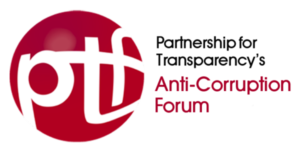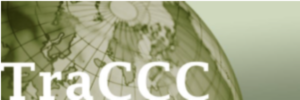

On May 10, the Terrorism, Transnational Crime and Corruption Center (TraCCC) and the Partnership for Transparency’s Anti-Corruption Forum co-hosted an event at George Mason University, featuring Laurence Cockcroft discussing his most recent book Unmasked: Corruption in the West. Cockcroft reflected on the process of writing the book and shared some of its key themes and examples.
Cockcroft’s experience in anti-corruption, laid out in his first book Global Corruption, began in the developing world. Yet, through his work as a founding Board member of Transparency International (TI) and as the Chair of TI-UK, the importance of exposing corruption in the West became increasingly clear. In Unmasked, Cockcroft focuses on corruption issues facing the EU, Canada, and the US by examining how the peddling of influence by special interest groups and corporations leads to the misuse of entrusted power.
The release of Cockcroft’s book coincides with the rise of populist movements across the West, many of which are reactions to establishment politics and forms of perceived corruption. According to a Gallup poll in 2015, 75% of Americans perceive corruption to be widespread in the US government.[1] The general feeling of relative lack of power is not unfounded, according to Cockcroft. The US Supreme Court Case, Citizens United vs. FEC, altered campaign finance restrictions and shifted the centers of influence to far fewer people making far greater contributions. Cockcroft suggested this influence inequality makes Congress captive to small groups of funders who do not represent the broader public. Cockcroft cited similar examples across Europe where restrictions on campaign finance were either repealed or subverted, leading to greater inequality in political influence.
Cockcroft’s book also examines the revolving door between the lobbying industry and government in both Europe and the US. In the EU, corporate sector lobbyists sit on expert committees advising on policy, which results in entire sections of legislation copied directly from industry lobbyists recommendation documents. Cockcroft states that this is just one example of how corporate meddling is not limited to vulnerable developing countries. The OECD Anti-Bribery Convention demonstrated the same companies behaving corruptly abroad, behave corruptly domestically as well.
In US policy, Cockcroft compared the attitudes and actions of the US banking industry following the Savings and Loans Crisis in the 1980’s and the 2008 Financial Crisis. Cockcroft argued that reckless lending should be considered a form of corruption, not just because the bundling of securities seen before the Crisis had predictable long-term consequences, but also because it involved specific manipulation. Cockcroft expressed astonishment at the lack of improvement of industry standards in banking saying, “I find it amazing that people within the banking industry at a senior level have not taken proper responsibility for this.”
Cockcroft closed with a few suggested solutions including increased regulation, compliance regimes, and an end to anonymous beneficial ownership and secrecy. Skeptical of corporate leadership and government complicity, Cockcroft turned to civil society as the agent of change. Declaring that “we are at quite a turning point,” Cockcroft urged forward action. “We have learned civil society can make a difference. Now is not the time to give up, now is the time to move forward.”
Learn more about the author and book here.
[1] “75% in U.S. See Widespread Government Corruption.” Gallup. September 19, 2015. http://www.gallup.com/poll/185759/widespread-government-corruption.aspx

